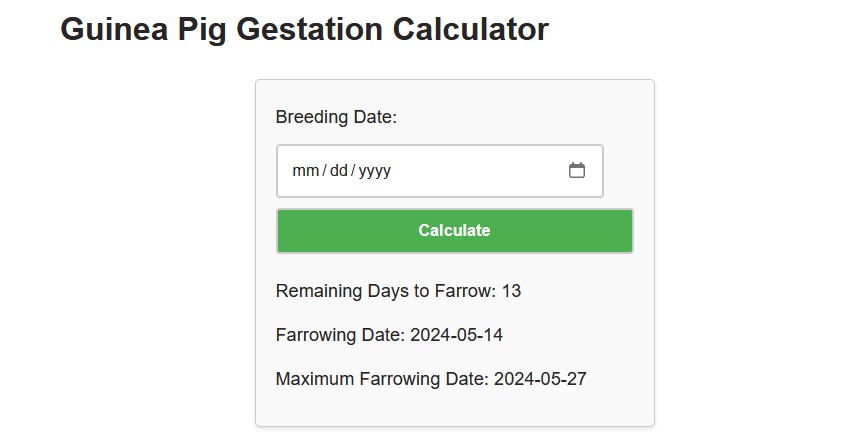Understanding the intricacies of Cavy’s pregnancy and using the gestation calculator can help you prepare for the arrival of the new additions to your cavy family.
By recognizing the signs of impending birth and providing appropriate care, you can ensure a smooth and successful delivery for your beloved guinea pig.
Welcoming a new litter of guinea pigs is an exciting experience for any cavy enthusiast. To ensure a smooth and successful pregnancy, it’s essential to understand the gestation period and be prepared for the arrival of the tiny furballs.
It simplifies the calculation process and provides owners or breeders with an estimated timeline for the arrival of the new litter.
Guinea Pig Gestation Calculator
The gestation period for guinea pigs, also known as cavies, typically ranges from 59 to 72 days, with an average of 63-68 days. To calculate the approximate due date, you can use the following formula:
Due Date = Date of Conception + Average Gestation Period
Let’s consider an example:
Suppose your guinea pig was successfully bred on March 1st, 2024. To calculate the approximate due date, you would add the average gestation period of 65 days to the date of conception:
Due Date = March 1st, 2024 + 65 days
Due Date = May 5th, 2024
Therefore, based on this calculation, you can expect your guinea pig to give birth around May 5th, 2024.
It’s important to note that this is an approximate estimate, as individual pregnancies may vary slightly in duration. Additionally, factors such as the sow’s age, health, and previous litter experiences can influence the gestation period.
How to Tell When a Guinea Pig is About to Give Birth?
As the due date approaches, there are several signs that indicate your guinea pig is nearing labor:
- Restlessness: Your pregnant guinea pig may become more restless and exhibit increased movement as the birth approaches.
- Nesting Behavior: Sows often prepare a nest by gathering hay, bedding, or other materials in a secluded area.
- Loss of Appetite: A decrease in appetite is common as the sow’s energy is directed towards the impending labor.
- Vaginal Discharge: You may notice a clear or slightly bloody discharge from the vaginal area.
- Contractions: Visible abdominal contractions signal the onset of active labor.
When Can You Tell a Guinea Pig is Pregnant?
In most cases, it’s difficult to visually confirm a guinea pig’s pregnancy until the later stages. However, there are a few signs that may indicate a successful breeding:
- Weight Gain: A pregnant guinea pig will gradually gain weight as the pregnancy progresses.
- Increased Appetite: Many sows experience an increased appetite and food intake during pregnancy.
- Belly Changes: As the litter grows, you may notice a rounding or swelling of the abdomen.
It’s essential to provide your pregnant guinea pig with a balanced diet, plenty of hay, and a quiet, stress-free environment throughout the gestation period.
How Far Apart Do Guinea Pigs Give Birth?
Guinea pigs can have multiple litters per year, with a typical interval of 59 to 72 days between each successful breeding. However, it’s important to allow your sow adequate time to recover and regain her strength before attempting another breeding.
Experienced breeders often recommend waiting at least 3-4 months after a successful delivery before introducing the sow to a male again. This helps ensure the health and well-being of both the sow and her offspring.
How Long Do Guinea Pigs Get Pregnant?
As mentioned earlier, the gestation period for guinea pigs typically ranges from 59 to 72 days, with an average of 63-68 days. This relatively short pregnancy duration is one of the reasons why guinea pigs are popular among breeders and pet enthusiasts.
It’s crucial to provide your pregnant guinea pig with proper nutrition, ample space, and a stress-free environment throughout this period to support the healthy development of the unborn litter.
Important Questions
How many babies do guinea pigs have in their first litter?
The number of babies (pups) in a guinea pig’s first litter can vary, but typically ranges from 1 to 4 pups. However, it’s not uncommon for experienced sows to have larger litters of up to 6 or 7 pups. Several factors, such as the sow’s age, health, and genetic lineage, can influence the litter size. It’s essential to provide proper nutrition and care to ensure the well-being of both the mother and her offspring.
Do guinea pigs give birth during the day or night?
Guinea pigs can give birth at any time, both during the day and at night. However, many sows tend to go into labor during the early morning hours or late evening. This behavior is believed to be an evolutionary adaptation, as giving birth at night or in the early morning hours may have provided better protection from predators in their natural habitat.
